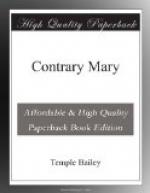“This is the sitting-room,” his guide was telling him, “and the bedroom and bath open out from it.” She had opened a connecting door. “This room is awfully torn up. But we have just finished dressing Constance. She is down-stairs now in the Sanctum. We’ll pack her trunks to-morrow and send them, and then if you should care to take the rooms, we can put back the bedroom furniture that father had. He used this suite, and brought his books up after mother died.”
He halted on the threshold of that inner room. If the old house below had seemed filled with rosy effulgence, this was the heart of the rose. Two small white beds were side by side in an alcove. Their covers were of pink overlaid with lace, and the chintz of the big couch and chairs reflected the same enchanting hue. With all the color, however, there was the freshness of simplicity. Two tall glass candlesticks on the dressing table, a few photographs in silver and ivory frames—these were the only ornaments.
Yet everywhere was lovely confusion—delicate things were thrown half-way into open trunks, filmy fabrics floated from unexpected places, small slippers were held by receptacles never designed for shoes, radiant hats bloomed in boxes.
On a chair lay a bridesmaid’s bunch of roses. This bunch Mary Ballard picked up as she passed, and it was over the top of it that she asked, with some diffidence, “Do you think you’d care to take the rooms?”
Did he? Did the Peri outside the gates yearn to enter? Here within his reach was that from which he had been cut off for five years. Five years in boarding-houses and cheap hotels, and now the chance to live again—as he had once lived!
“I do want them—awfully—but the price named in your letter seems ridiculously small——”
“But you see it is all I shall need,” she was as blissfully unbusinesslike as he. “I want to add a certain amount to my income, so I ask you to pay that,” she smiled, and with increasing diffidence demanded, “Could you make up your mind—now? It is important that I should know—to-night.”
She saw the question in his eyes and answered it, “You see—my family have no idea that I am doing this. If they knew, they wouldn’t want me to rent the rooms—but the house is mine—–I shall do as I please.”
She seemed to fling it at him, defiantly.
“And you want me to be accessory to your—crime.”
She gave him a startled glance. “Oh, do you look at it—that way? Please don’t. Not if you like them.”
For a moment, only, he wavered. There was something distinctly unusual in acquiring a vine and fig tree in this fashion. But then her advertisement had been unusual—it was that which had attracted him, and had piqued his interest so that he had answered it.
And the books! As he looked back into the big room, the rows of volumes seemed to smile at him with the faces of old friends.




